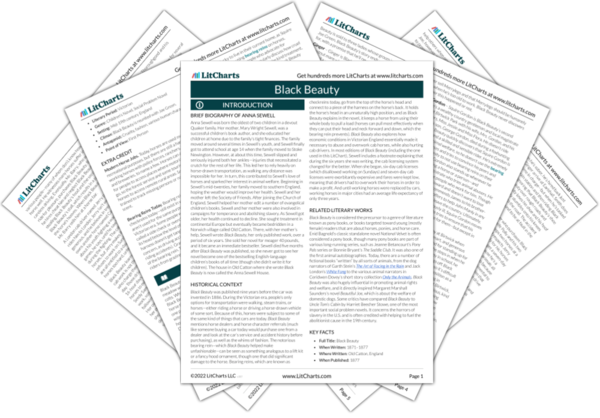Horse Care, Abuse, and Neglect
Black Beauty, the story of the titular equine protagonist’s life in Victorian England, is in many ways a study in what constitutes proper horse care—and the various ways that people can abuse or mistreat horses, accidentally and on purpose. Above all, the novel proposes that the most important thing a person who wants to take good care of a horse needs is knowledge of how to do so. The novel therefore goes into some…
read analysis of Horse Care, Abuse, and NeglectClass, Transportation, and Victorian England
Black Beauty introduces readers to a very specific period of history: a point in Victorian England when transportation options were limited to steam trains and either riding or driving a horse-drawn vehicle. Horses are animals with thoughts and feelings of their own, per the novel—but they’re also the dominant form of transportation in this period, and so are consistently thought of not as living beings, but as something akin to trains that go and go…
read analysis of Class, Transportation, and Victorian EnglandGood, Evil, and Power
In many respects, the horse Black Beauty’s life story of being sold from owner to owner in Victorian England is a morality tale about good and evil. Good people, per the novel, love their neighbors and their animals—and they stand up for the most vulnerable and powerless people and “dumb beasts.” So being good, in this sense, is about the actions that someone takes to spread good in the world, rather than simply wanting…
read analysis of Good, Evil, and Power
Dignity and Religion
As the various equine and human characters in Black Beauty discuss various forms of cruelty, many suggest much the same thing though in slightly different ways: that all beings, whether they be people, horses, or dogs, deserve to live a dignified life; and that this right is God-given. Black Beauty and his various companions often define dignity in terms of bodily autonomy. For instance, the horse Sir Oliver speaks passionately against the practice of docking…
read analysis of Dignity and Religion






